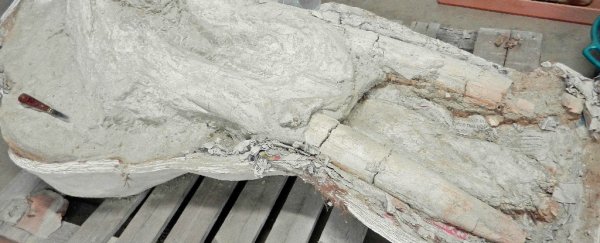Quick question – if you found a strange-looking fossil on your property, would you a) call the press, b) call the experts, or c) do neither because, well, who needs that kind of attention?
For those who went with c, you have a kindred spirit in a farmer who stumbled on a giant four-tusked skull near the French town of Toulouse back in 2014, and decided he didn't want his land overrun by amateur fossil hunters. Fair enough, too.
Either curiosity or civic duty got the better of him in the end. After keeping quiet for a couple of years he finally got in touch with the Toulouse Natural History Museum, who were amazed at the finding.
"It was only when we went there, in 2017, that we realised the significance of the discovery," the museum's management reported.
The bones belonged to a long-extinct relative of the elephant – Gomphotherium pyrenaicum – which roamed the area roughly 11 to 13 million years ago.
These odd-looking creatures had two tusks coming out of their lower jaw in addition to the more typical upper pair we seen in elephants today; these lower tusks were relatively flat and possibly used to dig for roots.
This particular species of Gomphotherium isn't well-represented in the fossil record, with only a few teeth uncovered around 150 years ago in the same area.
This is the first complete skull, making it an absolute gem find.
"We're putting a face on a species which had become almost mythical," says museum curator Pierre Dalous.
The next step for museum palaeontologists is to carefully extract the fossil from its casing of hardened sediment, which means they have months of careful scraping and chipping ahead of them.
So far a search of the immediate vicinity has failed to reveal the rest of its body.
There's no word on whether there are currently hordes of amateur fossil scavengers packing for the Pyrenees, or whether the farmer is now thinking of cashing in on his fame to turn the farm into Mastodon Park.
In some ways, his hesitation is to be lauded.
It's hard to even get an estimate on the number of privately owned fossils out there around the globe. Nearly every aspiring young palaeontologist has a few shark's teeth or a trilobite or two on their shelf.
Not all finds are so mundane, though. The fossil of a unique four-legged snake drew attention for all the wrong reasons a few years ago when it was uncovered in a private collection in Germany back in 2012.
Its origins were traced to Brazil, where the sale or distribution of fossils has been illegal since 1942.
China is another country with laws that attempt to wipe out trade in its rich diversity of fossils, which isn't always effective.
More than just a legal matter, however, the question of 'open fossils' is as pertinent today as 'open science'. Rare fossils behind glass might be a great conversation point for dinner parties, but away from expert eyes they do little to contribute to our knowledge of the past.
Having amateurs picking through the unnamed farmer's soil isn't just bad for his peace and quiet, but risks being bad for science.
Still, we're thankful that he stepped forward in the end to give this odd-ball elephant cousin a good home.
